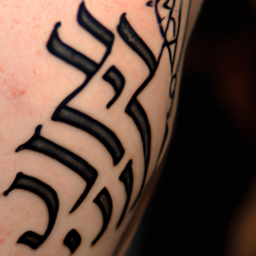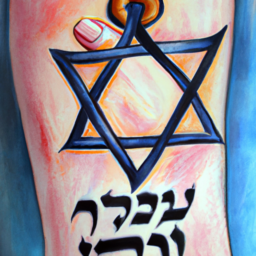“Hebrew Tattoo Translation Services: Ensure Your Ink is Accurate”
Introduction to Hebrew Tattoos
In recent years, the allure of Hebrew tattoos has captivated the hearts of many tattoo enthusiasts around the globe. The ancient script, with its elegant and mystical strokes, carries a profound cultural and historical significance that transcends its aesthetic appeal. Hebrew, the liturgical tongue of Judaism and the language of the State of Israel, is often chosen for tattoos by people seeking a connection with its rich heritage, religious symbolism, or the timeless wisdom encapsulated in its literature.
The popularity of Hebrew tattoos is not merely a trend but a reflection of a deeper desire to ink one’s skin with words that carry weight and meaning. Whether it’s a verse from the Torah, a Kabbalistic phrase, or a personal motto, the choice to use Hebrew script is often rooted in a quest for spiritual connection or a tribute to one’s heritage. However, the gravity of such a decision cannot be overstated. Accurate translation is paramount to ensure that the tattoo not only conveys the intended message but also respects the cultural and linguistic nuances of the Hebrew language.
The Risks of Inaccurate Translations
The path to adorning one’s body with Hebrew script is fraught with potential pitfalls, primarily due to translation errors. The internet abounds with cautionary tales of Hebrew tattoo mishaps, where individuals have been left with nonsensical or even offensive phrases permanently etched onto their skin. These blunders range from misspelled words to grammatically incorrect sentences, often the result of relying on unreliable online translation tools or tattoo artists who lack expertise in the Hebrew language.
The consequences of such mistranslations extend beyond personal embarrassment. They can inadvertently perpetuate stereotypes, foster cultural insensitivity, and even offend those who hold the Hebrew language and Jewish culture in high regard. A mistranslated tattoo can tarnish an individual’s image, especially if the error is glaring and publicly recognized. It can also lead to uncomfortable situations where the bearer has to explain or, in worse cases, defend their poorly translated ink.
Understanding the Hebrew Language
To appreciate the complexity of Hebrew tattoos, one must first understand the intricacies of the Hebrew language itself. Hebrew is a Semitic language, written from right to left, and its script is composed of 22 consonants. Vowels are not typically included in written Hebrew, except in children’s books, prayer books, or texts for those learning the language. This absence of vowels in everyday writing can lead to multiple interpretations of a word, making accurate translation a task for skilled linguists.
Moreover, the Hebrew language has evolved over time. Biblical Hebrew, with its archaic vocabulary and grammar, differs significantly from Modern Hebrew, the spoken language in contemporary Israel. This distinction is crucial when selecting a phrase for a tattoo, as the meaning and connotation can vary dramatically between the ancient and modern versions of the language.
The structure of Hebrew also presents challenges. It is a language rich in nuance, where a single root can spawn numerous words with related but distinct meanings. The context in which a word is used is vital to its interpretation. Therefore, a literal translation of a word or phrase may not capture its true essence or might even alter its meaning entirely.
In conclusion, Hebrew tattoos carry a beauty and depth that can be a source of pride and personal significance for those who choose to wear them. However, the journey to acquiring a Hebrew tattoo must be approached with diligence and respect for the language and culture it represents. Accurate translation is not just a matter of aesthetics but of cultural sensitivity and personal integrity. By understanding the risks of mistranslation and the complexity of the Hebrew language, individuals can ensure that their tattoos are not only visually striking but also linguistically and culturally authentic.

The Role of Professional Translation Services
In the realm of body art, Hebrew tattoos hold a unique allure, often chosen for their profound meanings and the timeless elegance of the Hebrew script. However, the beauty of these tattoos is deeply intertwined with their accuracy. This is where professional translation services become indispensable.
Unlike online translation tools, which often provide literal but contextually inaccurate translations, professional translators bring a nuanced understanding of the Hebrew language and culture. They are well-versed in the subtleties of both modern and biblical Hebrew, ensuring that the chosen phrase or word resonates with its intended meaning. The qualifications of these experts extend beyond language proficiency; they are cultural interpreters who bridge the gap between the tattoo wearer’s intentions and the linguistic heritage of the Hebrew language.
The benefits of using expert translators are manifold. They provide personalized attention to the client’s needs, taking into account the emotional and spiritual motivations behind the tattoo. This level of service is crucial, as a tattoo is a permanent mark that reflects one’s identity and beliefs. A mistranslation can lead to embarrassment or offense, not only to the individual but also to those who hold the Hebrew language and Jewish culture in high regard.
Professional translators also understand the importance of script and form. Hebrew is written from right to left, and each letter has a specific shape that can change depending on its position in a word. An expert will ensure that the tattoo is not only linguistically correct but also visually authentic, preserving the aesthetic integrity of the Hebrew script.
In essence, the role of professional translation services in the context of Hebrew tattoos cannot be overstated. They are the guardians of linguistic accuracy and cultural respect, providing a service that safeguards the individual’s image and honors the profound heritage of the Hebrew language.
The Translation Process Explained
The translation process for a Hebrew tattoo is meticulous and multi-layered. It begins with an in-depth consultation, where the translator seeks to understand the client’s desires and the significance behind their choice of words or phrases. This initial step is crucial, as it lays the foundation for a translation that captures the essence of the client’s intent.
Following the consultation, the translator delves into the linguistic intricacies of the Hebrew language. They consider the context and nuance of the chosen phrase, ensuring that it conveys the correct connotations and emotional resonance. For instance, a word that carries a certain meaning in modern Hebrew might have a different implication in its biblical form. The translator’s expertise allows them to navigate these subtleties and provide a translation that is both accurate and meaningful.
The importance of context and nuance cannot be overstated. Hebrew is a language rich in idiomatic expressions and cultural references. A direct translation without considering these elements can result in a phrase that is either nonsensical or carries an unintended message. Professional translators are adept at identifying and preserving these nuances, ensuring that the tattoo remains true to its intended purpose.
Once the translation is complete, the process is not yet over. The translator will often work closely with the tattoo artist to ensure that the script is correctly rendered. This collaboration is vital, as the artist must understand the directionality and structure of the Hebrew script to accurately transfer the design onto the skin.
The translation process for a Hebrew tattoo is a testament to the importance of precision and cultural sensitivity. It is a journey that requires patience, understanding, and a deep respect for the linguistic and cultural heritage that the tattoo represents.
Cultural Appropriation vs. Appreciation in Tattoos
The line between cultural appropriation and appreciation is a fine one, particularly in the context of tattoos. When it comes to Hebrew tattoos, this distinction becomes even more pronounced due to the deep historical and religious significance of the Hebrew language.
Cultural appropriation in tattoos occurs when symbols or scripts are used out of context, without understanding or respecting their cultural significance. This can lead to misrepresentation and can be seen as a form of disrespect towards the culture from which they originate. In the case of Hebrew tattoos, this could mean using sacred texts or religious symbols without comprehending their profound meanings or the sensitivities surrounding them.
On the other hand, cultural appreciation is about embracing another culture with respect and sensitivity. It involves taking the time to understand the cultural significance of the symbols or language being used and ensuring that their use honors the traditions and people to whom they belong. Accurate translations contribute significantly to cultural appreciation. They demonstrate a commitment to authenticity and respect for the cultural heritage of the Hebrew language.
By investing in professional translation services, individuals show that they value the culture behind the language and are willing to take the necessary steps to ensure their tattoos are a true reflection of their respect and admiration. This approach not only enriches the personal significance of the tattoo but also fosters a deeper connection between cultures.
In conclusion, the intersection of professional translation services, the meticulous translation process, and the sensitive navigation of cultural appropriation versus appreciation forms the cornerstone of a responsible approach to Hebrew tattoos. It is through this trifecta that individuals can proudly wear their tattoos, knowing that they embody accuracy, respect, and a genuine appreciation for the rich tapestry of the Hebrew language and Jewish culture.

Personalization and Customization of Hebrew Tattoos
In the realm of body art, Hebrew tattoos stand out for their profound significance and the allure of their ancient script. The personalization and customization of these tattoos are not merely about aesthetics; they are a journey into one’s soul, beliefs, and identity. When an individual decides to etch a Hebrew phrase or word onto their skin, it is often a declaration of their values, a cherished memory, or a personal mantra that guides them.
The collaboration between the tattoo artist, the translator, and the client is pivotal in this process. It is a triad that ensures the tattoo not only looks visually appealing but also resonates with the intended meaning. The translator plays a crucial role in bridging the gap between languages and cultures. They delve into the nuances of the Hebrew language, ensuring that the chosen word or phrase reflects the client’s intent without losing its essence in translation.
Working with a professional translator allows for a dialogue where clients can express the sentiment behind their desired tattoo. This exchange is essential, as Hebrew, with its rich history and complexity, can yield multiple interpretations of a single word or phrase. The translator’s expertise ensures that the tattoo embodies the correct connotation, be it a powerful single word or a more elaborate verse.
The customization process also involves the stylistic elements of the Hebrew script. The calligraphy can range from traditional to modern, each style carrying its own weight and beauty. Clients often look for a design that complements their personal style while staying true to the Hebrew script’s integrity. The tattoo artist must be adept at rendering the script accurately, as even a small error can alter the meaning dramatically.
Common Hebrew Phrases and Their Meanings for Tattoos
Hebrew tattoos often feature phrases that hold universal values or personal significance. Some popular choices include “אהבה” (ahava), meaning “love,” “חי” (chai), which signifies “life” or “living,” and “שלום” (shalom), translating to “peace.” These words carry deep meanings and are frequently chosen for their positive connotations and the desire to carry these virtues visibly.
However, the pitfalls in choosing a Hebrew phrase for a tattoo lie in cultural nuances and the potential for misinterpretation. For instance, the word “חי” can also mean “animal” in a different context. Therefore, understanding the context and the specific meaning one wishes to convey is crucial. Additionally, biblical phrases are often sought after, but they require careful consideration due to their religious significance and the potential for misapplication.
It is not uncommon for individuals to seek out verses from sacred texts. While this can be a beautiful homage to one’s faith or philosophical beliefs, it is essential to approach these choices with the utmost respect and understanding of the cultural and religious implications. Consulting with a knowledgeable source about the appropriateness of such texts is a step that should not be overlooked.
Case Studies: Success Stories of Accurate Hebrew Tattoos
The stories of individuals who have successfully acquired accurate Hebrew tattoos are testaments to the value of professional translation and the beauty of cultural exchange. These success stories often highlight the emotional and spiritual connection that clients develop with their tattoos, thanks to the meticulous work of translators and artists.
One such story involves a woman who wanted to honor her late grandmother, a Holocaust survivor. She chose the phrase “לעולם לא נשכח” (le’olam lo nishkach), meaning “never forget.” Working closely with a translator, she ensured that the phrase was contextually and grammatically correct, paying homage to her grandmother’s legacy with respect and accuracy.
Another case features a man who sought a tattoo of the word “אור” (or), meaning “light,” to represent his overcoming of personal struggles. The translator advised on the correct form of the word, considering the masculine and feminine nuances of Hebrew, ultimately providing a tattoo that was both linguistically correct and deeply meaningful to the client.
These stories underscore how proper translation not only prevents embarrassing errors but also enriches the tattoo experience. The individuals involved often speak of a sense of pride and a deeper connection to their heritage or chosen philosophy, thanks to the authenticity of their tattoos.
In conclusion, the value of accuracy in Hebrew tattoo art cannot be overstated. Personalization and customization, when done with care and expertise, transform a simple tattoo into a profound statement. The choice of common Hebrew phrases for tattoos should be navigated with an understanding of the language’s depth and cultural context. The success stories of accurate Hebrew tattoos serve as a reminder of the beauty that arises from respecting and honoring the complexities of language and culture. As Hebrew tattoos continue to captivate the hearts of many, it is the responsibility of translators, artists, and clients alike to ensure that these pieces of art are created with the reverence and precision they deserve.

The Value of Accuracy in Hebrew Tattoo Art
In the realm of body art, Hebrew tattoos hold a unique allure, captivating the imagination with their ancient script and profound meanings. As more individuals seek to express their identity, beliefs, or a connection to their heritage through tattoos, Hebrew script has emerged as a popular choice. However, the true value of a Hebrew tattoo lies not just in its aesthetic appeal but in the accuracy of its translation and the respect it pays to the language and culture it represents.
Hebrew, with its deep historical roots and religious significance, is a language that commands respect. It is not merely a collection of symbols to be used for their visual impact; each letter, each word carries with it a weight of cultural and linguistic importance. When one chooses to inscribe a Hebrew phrase on their skin, they are making a statement that transcends the ink and the needle—it is a declaration of a message they wish to carry with them for life.
The importance of accuracy in Hebrew tattoo art cannot be overstated. A mistranslation or a miswritten character can transform a meaningful phrase into an object of ridicule or, worse, an offensive statement. The internet abounds with cautionary tales of Hebrew tattoo blunders, from misspelled words to phrases that have been flipped or written backward, rendering them nonsensical or conveying an entirely different meaning than intended. Such errors not only compromise the personal significance of the tattoo but can also be seen as a sign of disrespect towards the Hebrew language and the cultures it represents.
Professional translation services are the cornerstone of ensuring accuracy in Hebrew tattoos. These experts bring a deep understanding of the language’s nuances, its idiomatic expressions, and the cultural context that is often crucial to conveying the intended message. They are adept at navigating the complexities of both modern and biblical Hebrew, recognizing that certain phrases may carry different connotations across different eras and contexts.
The translation process for a Hebrew tattoo is meticulous. It begins with understanding the client’s intent and the message they wish to convey. Translators then consider the context, the cultural nuances, and the structure of the Hebrew language to craft a translation that is both accurate and meaningful. This process often involves back-and-forth communication with the client to ensure that the final product truly reflects their desired sentiment.
Beyond the linguistic accuracy, there is also the matter of cultural sensitivity. In an age where cultural appropriation is a hotly debated topic, it is crucial to approach the adoption of elements from another culture with respect and understanding. Accurate translations contribute to cultural appreciation by demonstrating a commitment to honoring the source material’s integrity. They show that the wearer has taken the time to understand and respect the language and culture from which they are drawing inspiration.
Personalization and customization are integral to the tattoo experience. Working closely with a translator allows individuals to infuse their tattoos with personal meaning, ensuring that the Hebrew script resonates with their personal story or values. This collaboration between the artist, the translator, and the client is what elevates a Hebrew tattoo from mere decoration to a profound statement of identity.
In conclusion, the value of accuracy in Hebrew tattoo art is immeasurable. It is the difference between a tattoo that is cherished and one that is regretted, between a mark of respect and a sign of ignorance. As the popularity of Hebrew tattoos continues to grow, it is incumbent upon those who choose to bear these sacred scripts on their skin to do so with the utmost responsibility and pride. By investing in professional translation services, individuals can ensure that their Hebrew tattoos are not only visually striking but also linguistically and culturally authentic, becoming a true testament to the beauty and depth of the Hebrew language.

